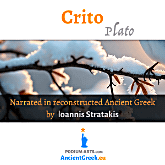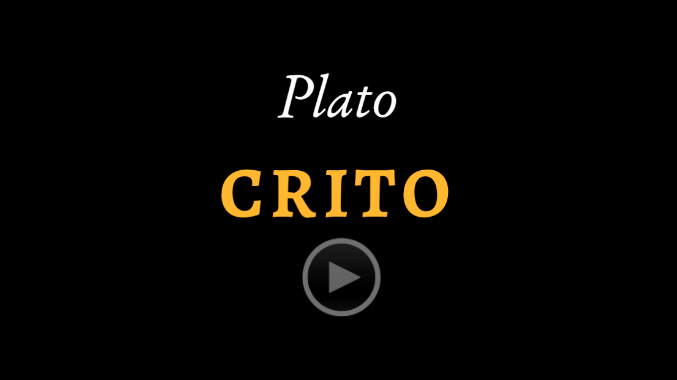• Crito •
• Plato •

About the platonic Crito
Crito (Greek: «Κρίτων») is one of Plato’s dialogues that takes place in Socrates’ prison cell, where he awaits execution. The dialogue centers around a conversation between Socrates and his wealthy friend Crito, who comes to visit him early in the morning. Crito urges Socrates to escape from prison and avoid his impending death, as he believes it is unjust for Socrates to be executed, especially given the opportunity for escape.
Crito presents several arguments to persuade Socrates, including the idea that Socrates' death will harm his friends and family, particularly his children, who will be left without a father. He also argues that people will think poorly of Socrates' friends for not helping him escape when they had the means to do so. Moreover, Crito suggests that Socrates’ adherence to the law, which led to his conviction, is misguided—since the trial itself was unjust, he should not accept his sentence.
However, Socrates rejects all of Crito's arguments with a series of counterpoints. He insists that one should never commit an injustice, even in response to an unjust action. Socrates argues that escaping from prison would mean violating the social contract between the individual and the state, which he sees as morally wrong. He believes that by living in Athens and enjoying its protections, he has implicitly agreed to obey its laws, even when they result in unfavorable outcomes. For Socrates, the key is to uphold virtue and justice above all else, regardless of personal consequences.
In the end, Socrates decides not to escape and accepts his fate, reinforcing his commitment to moral integrity and the rule of law. The dialogue illustrates Plato’s exploration of justice, the relationship between the individual and society, and the philosophical importance of adhering to one’s principles.
About Plato
Plato, (Greek: «Πλάτων») the great philosopher of antiquity, is the best known disciple of Socrates and teacher of –among others- Aristotle (Gr: Ἀριστοτέλης). He was born in Athens in 427 BCE and descended from an aristocratic family. His father descended from King Codrus, (Gr: Κόδρος) while his mother was related to Solon. Thanks to the financial situation of his family he received a wide education and aspired to engage in politics. However, he gave up this desire, as his uncles Charmides (Gr: Χαρμίδης) and Critias (Gr: Κριτίας) were among the Thirty Tyrants. What, however, marked Plato’s life was his acquaintance with Socrates, at the age of 20. He remained by him for 9 years, and after the death of his master in 399 BCE he fled to the city of Megara.
He then made several voyages, to Egypt, Cyrene, Magna Grecia, and Sicily, where he came in contact with the Pythagoreans. Despite the relationship he developed with the tyrants of Syracuse Dionysius I, Dionysius II and Dion, he did not manage to turn them into Philosopher-Kings. On his return from the first voyage his life was in danger and he was sold as a slave. The 387 BCE he founded the “Academy” (Gr: Ἀκαδημία), where he taught for many years.
Plato’s surviving work is especially rich. 35 dialogues and 13 letters came down to us. The works considered genuine include 26 dialogues, the Apology of Socrates and the 7th Epistle, which is seems autobiographical. His works, besides the Apology and the Letters, are written in dialogue form. The central figure in the dialogues, except in the “Laws”, is Socrates. In no dialogue, however, does Plato himself appear. His dialogues are titled by the name of one of the participants, e.g. Timaeus, Gorgias, etc. Only six dialogues, the Symposium, the Republic, the Sophist, the Statesman, the Laws, and the Epinomis, were titled from their subject of inquiry.
You can read a concise biography here, here or here.
About the audiobook
 The recording contains the unabridged Ancient Greek text.
The recording contains the unabridged Ancient Greek text.
After purchase you will be able to download the relevant mp3 file.
• Videobooks available upon request
You can listen to a short sample in the following video.
